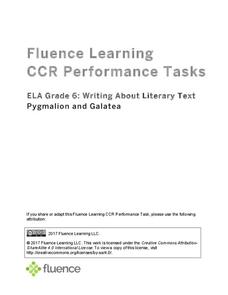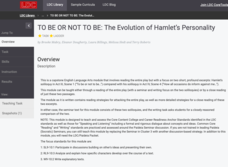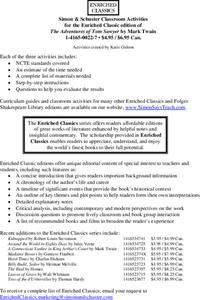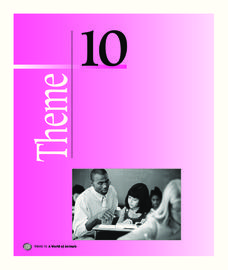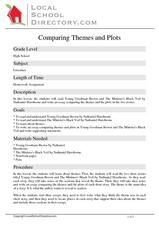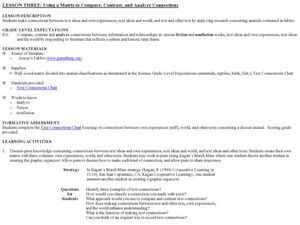EngageNY
Introducing “If” and Noting Notices and Wonders of the First Stanza
After reading chapter 14 of the story Bud, Not Buddy by Christopher Paul Curtis, scholars take part in a read-aloud of the poem If by Rudyard Kipling and compare it to the reading of Bud, Not Buddy. Learners then go deeper into the poem...
Positively Autism
"The Napping House" Big and Little
The dog is big. The mouse is little. Using vocabulary words introduced in the previous lesson, kids read, or are read, sentences and examine images that contrast big and little.
EngageNY
Grade 10 ELA Module 1: Unit 1, Lesson 3
Poets write love letters, but how often do the objects of their love write back? Compare Christopher Marlowe's "A Passionate Shepard to His Love" to Sir Walter Raleigh's response, "The Nymph's Reply to the Shepherd," with an engaging...
Fluence Learning
Writing About Literary Text: Pygmalion and Galatea
Is it crazy to fall in love with your own work, or is that the purest love of all? Compare two renditions of the classic Greek myth Pygmalion and Galatea with a literary analysis exercise. After students compare the similarities and...
Academy of American Poets
Teach This Poem: "The Metier of Blossoming" by Denise Levertov
Poetry analysis need not be a lugubrious exercise for young learners. The approach used with Denise Levertov's poem, "The Metier of Blossoming" is one of close observation, of noticing and reflecting on the words, phrases, and images the...
Constitutional Rights Foundation
Puritan Massachusetts: Theocracy or Democracy?
Was Puritan society governed as more of a theocracy or democracy? After comparing and contrasting a series of primary source documents, middle and high schoolers form small groups and debate the question.
Michigan Department of Education
Family Fundamentals for Summer Learning
Just because it's summertime, doesn't mean that learning has to stop. Support children with continuing to develop their reading fluency with this extensive collection of literacy activities.
Scholastic
Marijuana: Breaking Down the Buzz
Teenagers get the real information about marijuana use based on the history of tobacco legislation and research. As they read an educational passage about marijuana laws, science, and changing attitudes, they address their preconceptions...
Literacy Design Collaborative
To Be or Not to Be: The Evolution of Hamlet’s Personality
How does Hamlet's state of mind change over the course of Shakespeare's most famous revenge tragedy? After a close reading of Hamlet's soliloquies in Act III, scene 1 and Act IV, scene iv, class members engage in a Paideia/Socratic...
Fluence Learning
Writing About Literature Shakespeare and Plutarch
The Oscar for the Best Adapted Screenplay acknowledges a writer's excellence in adapting material found in another source. What do your class members know about adapted resources? Find out with an assessment that asks readers to compare...
Facing History and Ourselves
A Contested History
Memories of and interpretations of history change—that's the key takeaway from a lesson that has young historians compare the story of the Reconstruction Era as told by the historians of the Dunning School to the view of scholars today...
Simon & Schuster
Classroom Activities for The Adventures of Tom Sawyer by Mark Twain
A 16-page packet includes three activities for a unit study of Mark Twain's The Adventures of Tom Sawyer. Before beginning the novel, class members identify the factors in their lives that helped create their frame of reference,...
National Endowment for the Humanities
Dramatic Perspective in Moby Dick
A activity on Herman Melville's Moby Dick asks readers to compare the first person point of view of Ishmael in Chapter 1 to Captain Ahab's dramatic monologue in Chapter 37. Readers cite evidence from the chapters to support their...
K20 LEARN
Antigone's Themes Today: The Greek Drama Antigone
Is Antigone relevant to today's readers? After reading Sophocles' tragedy, scholars must decide if the themes are universal and timeless. Class members engage in a series of activities designed to have them closely consider the...
Houghton Mifflin Harcourt
A World of Animals: Challenge Activities (Theme 10)
Animals are the theme of this series of challenge activities. Extend scholars' learning opportunities by writing personal narratives and book reports, creating picture and alphabet books, and drawing scenes from stories read aloud.
Newseum
Making a Change: Letter From Birmingham Jail
Martin Luther King Jr.'s "Letter From Birmingham Jail" was written in response to "A Call for Unity," written by eight white ministers from Birmingham and published in the local newspaper. After reading both letters and following a list...
Academy of American Poets
Teach This Poem: "On Being Brought from Africa to America" by Phillis Wheatley
Phillis Wheatley's poem, "On Being Brought from Africa to America" is the focus of a lesson that asks readers to consider how the poem is a critique of slavery. Groups comprise a list of words and phrases they notice as well as questions...
Great Books Foundation
Rattlesnakes
John Muir may be a friend to the natural world, but as a short reading passage confirms, he is no friend to rattlesnakes. As young readers learn about Muir's encounters with the dangerous creatures, they answer four comprehension...
Curated OER
Comparing or Contrasting Two Books
Students read two books and complete a compare and contrast of the two books. For this compare and contrast lesson, students read two books in the same genre and write an essay comparing and contrasting them.
Curated OER
Compare and Contrast
Fourth graders read two books In this compare and contrast instructional activity, 4th graders read a science fiction or fantasy story and compare it to the story, "Help! I'm a Prisoner in the Library." Students also have the option to...
Curated OER
Comparing Themes and Plots
Students compare theme and plot in two short stories by Nathaniel Hawthorne. In this theme and plot analysis instructional activity, students read Young Goodman Brown and The Minister's Black Veil as well as take notes about the theme...
Curated OER
Comparing The Hobbit and The Fellowship of the Ring
Learners read The Hobbit and The Fellowship of the Ring by J.R.R. Tolkien and write a comparison of the two books. In this Tolkien novel analysis lesson plan, students read the novels and select characters, plot, theme, or other element...
Curated OER
Using a Matrix to Compare, Contrast, and Analyze Connections
Students explore writing techniques by comparing fiction vs. non-fiction. In this literature analysis lesson, students read stories from Aesop's Fables and compare the themes and characters to stories from their own life. Students...
Curated OER
Comparing Two Poe Classics
Students read and discuss The Black Cat and The Tell-Tale Heart. In this poetry lesson, students construct a Venn diagram to compare and contrast two pieces of literature.





